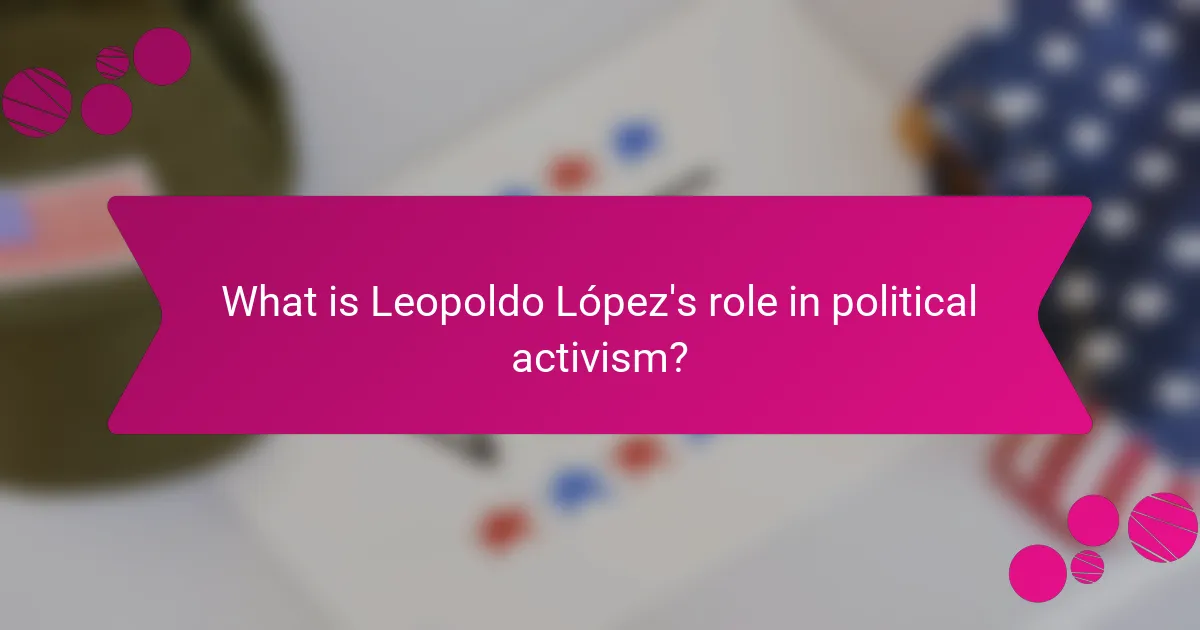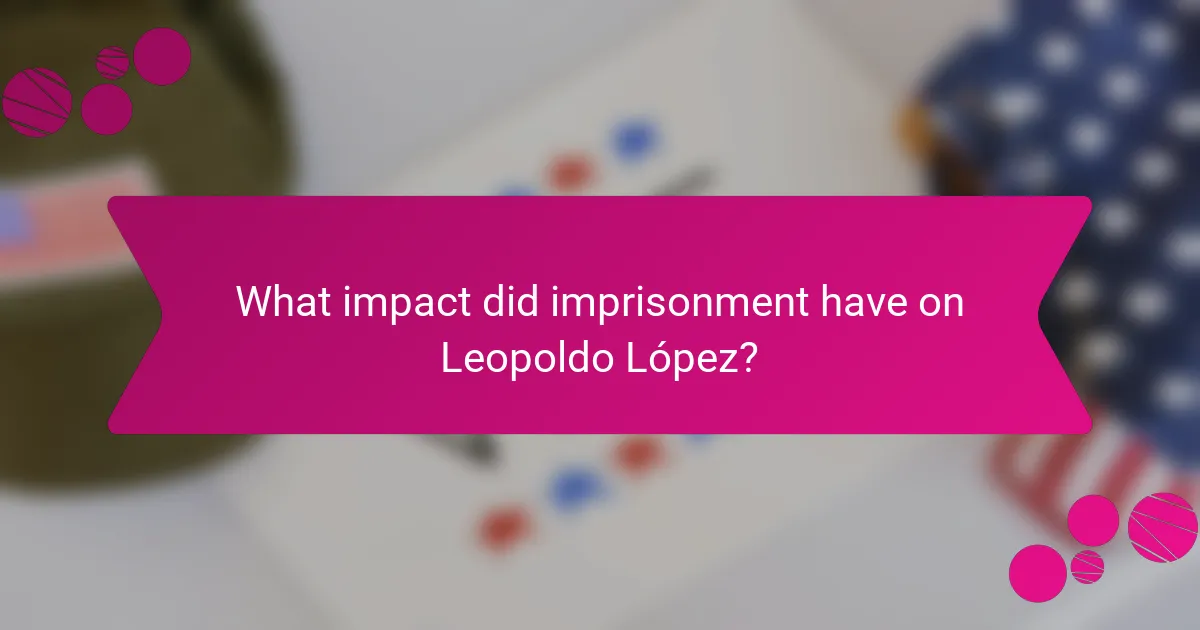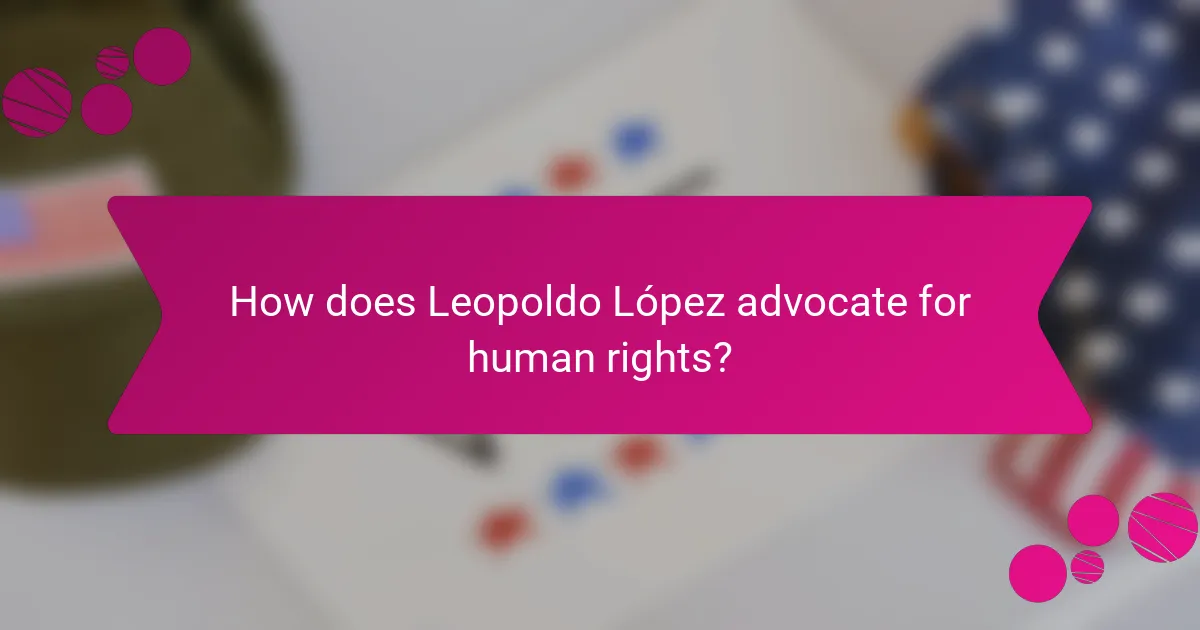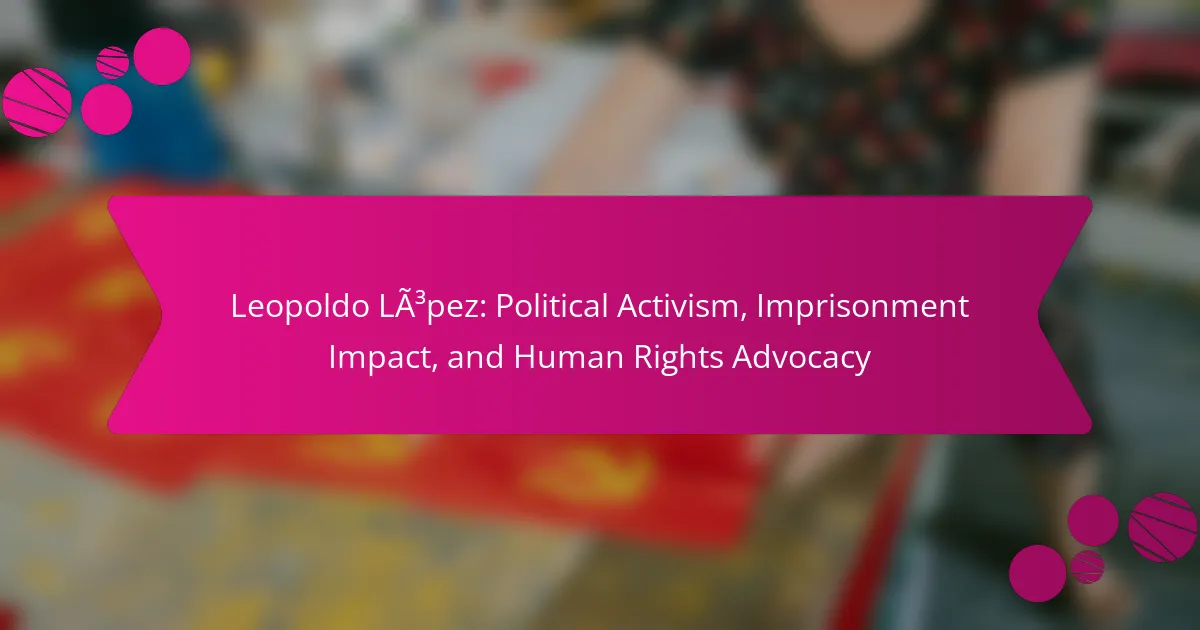
What is Leopoldo López’s role in political activism?
Leopoldo López is a prominent Venezuelan political activist. He has been a key figure in opposing the Venezuelan government led by Nicolás Maduro. López co-founded the political party Voluntad Popular. His activism focuses on promoting democracy and human rights in Venezuela. He has organized protests against government policies and corruption. López was imprisoned for several years due to his political activities. His imprisonment drew international attention to human rights abuses in Venezuela. López’s role continues to inspire activists both in Venezuela and globally.
How did Leopoldo López become involved in Venezuelan politics?
Leopoldo López became involved in Venezuelan politics through his early activism and leadership roles. He co-founded the political party Primero Justicia in 2000, which focused on democratic reforms. López gained prominence as the mayor of Chacao, a municipality in Caracas, where he advocated for social issues. His opposition to the Chávez government intensified during the 2004 recall referendum. He became a vocal critic of the government, emphasizing human rights and democracy. In 2014, he led protests against the Nicolás Maduro regime, which resulted in his arrest. López’s political journey has been marked by his commitment to democratic principles and human rights advocacy.
What key events shaped López’s political beliefs?
López’s political beliefs were shaped by several key events. His early exposure to political activism influenced his views. The 1989 Caracazo protests against economic policies marked a significant turning point for him. The 1992 coup attempt by Hugo Chávez also impacted his understanding of power dynamics. López’s experience studying in the United States provided him with a broader perspective on democracy. His leadership role in the 2002 protests against Chávez solidified his commitment to opposition politics. The 2014 protests against the Maduro government further defined his stance on human rights. His subsequent imprisonment in 2014 highlighted issues of political repression in Venezuela. Each of these events contributed to his evolving political ideology and advocacy for democratic reforms.
Who are the main influences in López’s political journey?
Leopoldo López’s political journey has been influenced by several key figures. His father, Leopoldo López Gil, was a prominent politician in Venezuela. López was also inspired by the democratic ideals of Simón Bolívar. His experiences in student leadership during the 1990s shaped his political views. Additionally, international leaders advocating for democracy have played a role in his activism. These influences have guided his commitment to human rights and democratic governance.
What are the core principles of López’s activism?
López’s activism is grounded in principles of democracy, human rights, and non-violence. He advocates for political change through peaceful protests and civic engagement. López emphasizes the importance of free elections and the rule of law in Venezuela. His activism seeks to unite various opposition groups against authoritarianism. He promotes dialogue and reconciliation as means to resolve political conflicts. López also highlights the need for international solidarity in supporting Venezuelan democracy. His approach combines grassroots mobilization with strategic political actions. These principles reflect his commitment to a democratic Venezuela and the protection of human rights.
How does López advocate for democracy and human rights?
López advocates for democracy and human rights through public speeches and international campaigns. He mobilizes support by raising awareness about political repression in Venezuela. López engages with global leaders to promote sanctions against the Venezuelan government. He emphasizes the importance of free elections and civil liberties in his activism. His organization, Voluntad Popular, focuses on grassroots mobilization for democratic reforms. López’s writings and social media presence highlight human rights abuses. He has participated in international forums to discuss Venezuela’s political crisis. His efforts aim to unite opposition groups against authoritarianism.
What strategies does López use to mobilize support?
López mobilizes support through grassroots organizing, social media campaigns, and international advocacy. He engages citizens by promoting political awareness and encouraging participation in protests. López utilizes social media platforms to disseminate information and rally support quickly. He also builds coalitions with other opposition leaders and civil society organizations. His international advocacy involves seeking support from foreign governments and human rights organizations. López’s strategies emphasize creating a united front against the Venezuelan government. This multifaceted approach aims to sustain momentum in the fight for democracy and human rights in Venezuela.

What impact did imprisonment have on Leopoldo López?
Imprisonment significantly impacted Leopoldo López by amplifying his status as a political prisoner. It drew international attention to the political situation in Venezuela. His imprisonment became a symbol of the government’s repression of dissent. López’s prolonged detention lasted nearly four years, from 2014 to 2018. During this time, he faced harsh conditions, including solitary confinement. This experience strengthened his resolve and commitment to democracy and human rights. Following his release, López continued to advocate for political change in Venezuela. His imprisonment highlighted the broader human rights abuses occurring in the country.
How did López’s imprisonment affect his political career?
López’s imprisonment significantly impacted his political career by elevating his status as a political prisoner. His detention garnered international attention and support for his cause. This increased visibility helped to mobilize opposition against the Venezuelan government. His imprisonment also solidified his role as a symbol of resistance. Many activists rallied around his plight, which energized the opposition movement. Additionally, López’s imprisonment led to greater scrutiny of human rights abuses in Venezuela. His situation highlighted the need for political reform in the country. Overall, López’s imprisonment transformed him into a key figure in Venezuelan politics.
What were the circumstances surrounding López’s arrest?
López was arrested on April 18, 2014, during a protest against the Venezuelan government. The protest aimed to address issues such as inflation and scarcity of basic goods. Authorities accused him of inciting violence and promoting unrest. His arrest occurred after a series of demonstrations that turned violent. López was subsequently charged with several offenses, including conspiracy. The international community criticized his arrest as politically motivated. Human rights organizations argued it was an attempt to silence dissent. López’s imprisonment became a focal point for human rights advocacy in Venezuela.
How did López’s imprisonment change public perception of him?
López’s imprisonment significantly shifted public perception, portraying him as a martyr for democracy. Initially, he faced criticism for his political methods. However, his imprisonment highlighted the Venezuelan government’s repressive tactics. This garnered international attention and sympathy for López. Many began to view him as a symbol of resistance against authoritarianism. His plight resonated with both local and global audiences. Consequently, public support for his cause increased. López’s situation became emblematic of broader human rights issues in Venezuela.
What were the international reactions to López’s imprisonment?
International reactions to Leopoldo López’s imprisonment were largely condemnatory. Various governments and human rights organizations criticized the Venezuelan government for its actions. The United States called López’s imprisonment a political move aimed at silencing dissent. The European Union expressed concerns about the state of democracy and human rights in Venezuela. Amnesty International labeled López a prisoner of conscience. Latin American countries also voiced their disapproval, urging for his release. These reactions highlighted a global consensus against political repression in Venezuela.
How did global leaders and organizations respond?
Global leaders and organizations responded with condemnation and calls for action. The United Nations Human Rights Council criticized Venezuela’s government for human rights violations. The European Union imposed sanctions on Venezuelan officials. Many countries, including the United States, called for López’s release. Human Rights Watch and Amnesty International highlighted López’s imprisonment as politically motivated. International protests were organized to raise awareness about his situation. These responses aimed to pressure the Venezuelan government to improve its human rights record.
What role did social media play in raising awareness?
Social media played a crucial role in raising awareness about Leopoldo López’s political activism and imprisonment. Platforms like Twitter and Facebook facilitated real-time sharing of information. Activists used these platforms to mobilize support and disseminate news about López’s situation. Hashtags such as #FreeLópez trended globally, increasing visibility. Social media allowed for the documentation of human rights abuses in Venezuela. It connected international audiences to López’s cause, fostering global solidarity. Reports indicate that social media campaigns significantly influenced public opinion and political pressure on the Venezuelan government. The widespread sharing of López’s story contributed to international advocacy efforts for his release and human rights reforms in Venezuela.

How does Leopoldo López advocate for human rights?
Leopoldo López advocates for human rights through activism, speeches, and international engagement. He has been a vocal critic of the Venezuelan government. López promotes democratic values and denounces human rights violations. He founded the political party Voluntad Popular, which focuses on social justice. López has mobilized protests to raise awareness of political repression. His imprisonment drew global attention to human rights issues in Venezuela. López engages with international organizations to garner support for Venezuelan democracy. He emphasizes the importance of freedom of expression and political pluralism.
What initiatives has López launched to promote human rights?
López has launched several initiatives to promote human rights. He founded the organization “Voluntad Popular,” which advocates for democratic rights and freedoms in Venezuela. López has also worked on international campaigns to raise awareness about human rights abuses in his country. He has engaged with foreign governments and organizations to pressure the Venezuelan regime. Additionally, López has participated in global forums discussing human rights issues. His efforts have included mobilizing support for political prisoners in Venezuela. These initiatives aim to restore democracy and protect human rights within the nation.
How does López collaborate with international human rights organizations?
López collaborates with international human rights organizations by actively engaging in advocacy efforts. He utilizes his platform to raise awareness about human rights violations in Venezuela. López communicates with organizations like Amnesty International and Human Rights Watch. He shares information about political prisoners and government repression. His collaboration often includes participating in global forums and conferences. López also mobilizes international support for sanctions against the Venezuelan government. He has been involved in campaigns to promote democracy and human rights in his country. His efforts have helped to keep Venezuela’s human rights situation in the global spotlight.
What specific human rights issues does López focus on?
López focuses on issues such as political repression, freedom of expression, and human rights violations in Venezuela. He advocates against the government’s authoritarian practices. López highlights the imprisonment of political opponents and activists. He raises awareness about extrajudicial killings and torture. López also addresses the plight of refugees fleeing the regime. His activism emphasizes the need for democratic reforms. He seeks international support to pressure the Venezuelan government. López’s work aims to restore fundamental rights for all Venezuelans.
What challenges does López face in his advocacy efforts?
López faces significant challenges in his advocacy efforts. He contends with government repression aimed at silencing dissent. This includes harassment, intimidation, and threats directed at him and his supporters. Additionally, the Venezuelan government employs legal measures to restrict his activities. These actions create an environment of fear among potential allies and activists. López also faces limitations on media coverage, which hampers his ability to reach a wider audience. The lack of international support further complicates his advocacy efforts. These factors collectively undermine his mission for human rights and democratic reforms in Venezuela.
How do political conditions in Venezuela impact López’s work?
Political conditions in Venezuela significantly hinder Leopoldo López’s work. The authoritarian regime limits freedom of expression and political dissent. López faces constant threats of imprisonment and violence due to his activism. His ability to mobilize supporters is restricted by government crackdowns. International sanctions against the Venezuelan government complicate his advocacy efforts. Human rights violations in Venezuela create a dire context for his mission. López’s work focuses on promoting democracy and human rights, which is met with resistance. The political climate necessitates strategic adaptation for effective activism.
What obstacles does López encounter from the government?
López encounters significant obstacles from the Venezuelan government, primarily through repression and legal actions. The government has imposed restrictions on his political activities. López has faced multiple arrests and imprisonment under politically motivated charges. These actions are aimed at silencing his dissent against the regime. Additionally, he has experienced harassment and intimidation directed at his supporters. The government has also restricted media coverage of his activism. These obstacles hinder his ability to advocate for human rights effectively. The systematic repression reflects broader trends of authoritarian governance in Venezuela.
What practical steps can individuals take to support López’s cause?
Individuals can support López’s cause by raising awareness about his situation. Sharing information on social media can amplify his message. Writing to local representatives can urge them to take action. Participating in peaceful protests can demonstrate solidarity. Donating to organizations advocating for human rights can provide necessary resources. Engaging in community discussions can educate others on the issue. Signing petitions can show collective support for his release. Supporting independent media can help keep the conversation alive.
How can people get involved in human rights advocacy?
People can get involved in human rights advocacy by joining organizations that focus on human rights issues. Many organizations, such as Amnesty International and Human Rights Watch, offer membership and volunteer opportunities. Individuals can also participate in campaigns and events that raise awareness about human rights violations. Writing letters to government officials and engaging in peaceful protests are effective ways to express support. Educating oneself and others about human rights issues is crucial. Sharing information on social media can amplify advocacy efforts. Supporting victims of human rights abuses by donating or fundraising helps sustain advocacy work. Engaging in discussions and forums can foster a deeper understanding of human rights challenges.
What resources are available for those wanting to learn more?
Books and articles on Leopoldo López provide valuable insights into his activism and human rights work. Key resources include “The Venezuelan Crisis: A Human Rights Perspective” by Human Rights Watch. Documentaries like “The Last Man in Venezuela” offer visual context to his story. Online platforms like Amnesty International feature reports on López’s imprisonment and its implications. Academic journals publish research on Venezuelan politics that include López’s role. Social media accounts of human rights organizations provide real-time updates on his situation. These resources collectively enhance understanding of López’s impact on political activism and human rights advocacy.
Leopoldo López is a prominent Venezuelan political activist known for his opposition to the Nicolás Maduro government and his advocacy for democracy and human rights. The article outlines López’s political journey, including his founding of the political party Voluntad Popular, his imprisonment, and the international reactions to his activism. Key events that shaped his beliefs are discussed, alongside the core principles of his activism, which emphasize non-violence and civic engagement. Additionally, the article examines the challenges López faces in his advocacy efforts and provides practical steps for individuals to support his cause and get involved in human rights advocacy.
